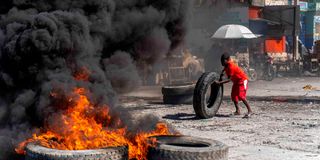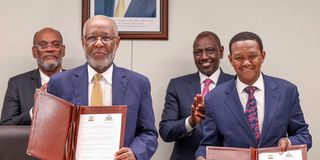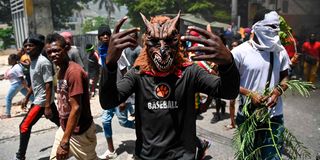Premium
Mission Haiti no walk in the park, Kenya told

A Haitian police officer stands guard outside of the presidential residence in Port-au-Prince.
Kenya may be part of the Multinational Security Support (MSS) Mission to Haiti as soon as November if the United Nations Security Council approves the deployment.
According to a draft text fronted by the US and backed by Ecuador, Kenya’s role will be in a three-part service – providing operational support against gangs, guarding installations and training Haitian police.

Residents protest the killing of six police officers by armed gangs in Port-au-Prince, Haiti, on January 26. The officers died in the town of Liancourt on January 25 after a fierce battle with gunmen who had tried to take over a police station.
The offers and process of seeking approvals look legally sound, but come on the back of questions, top of which is whether the MSS is any different from the previous five foreign missions in Haiti.
The UN, the US, Canada and France have deployed soldiers to Haiti before.
“People face attacks by armed gangs controlling areas in the capital or provincial towns. They assassinate, set fires, steal and abuse with cruelty. They drive citizens from their homes, block roads and force schools, hospitals and businesses to close,” Haitian PM Ariel Henry told the UN on Friday.
Celebrated for becoming the first Black majority country to defeat slavers and colonialists in the 19th century, Haiti’s history has been replete with coups, criminal gangs and assassination of presidents.
President Juvenal Moïse was shot dead at his palace in Porto au Prince in July 2021.
The MSS has been endorsed by the Caribbean Community (CARICOM), the regional bloc to which Haiti is a member. Antigua and Barbuda, the Bahamas and Jamaica pledged personnel for the mission.
President William Ruto this week said the world had let Haiti down.
“Haiti deserves better. The cry of our brothers and sisters...has reached our ears and touched our hearts. Doing nothing is out of question,” he told the UN General Assembly on Thursday.

President William Ruto and Haiti Prime Minister Ariel Henry witnessing the signing of an agreement at the Kenyan Mission in New York, United States.
“Inaction is no longer an option. As we mobilise to show up for Ukraine, and countries that have experienced the devastating impact of climate shocks including Libya, Morocco and Hawaii, we must not leave Haiti behind.”
Previous missions left a bitter taste in the mouths of Haitians and the Caribbean.
David Abdulah, a member of the Regional Executive Committee of the Assembly of the Caribbean People, says Haiti’s experience means the MSS may make the crisis worse.
“It is clear that Kenya is being promoted as a proxy since the countries of the Core Group – the US, Canada and France – recognise that resentment to their military intervention would be immense,” he wrote on behalf of the Assembly to the CARICOM, on September 5.

A man wears a werewolf mask during a protest against insecurity, on August 7, 2023, near the Prime Minister’s official house in Port-au-Prince, Haiti. Some 300 women and minors were kidnapped in Haiti by criminal gangs in the first half of this year.
“We need to appreciate the dynamics of the Haitian society and the fact that there is an elite that wields significant power. Henry and any successor to him established through an electoral process that is not free or fair will enable the elites maintain their hold on power – to the satisfaction of the Core Group.”
Kenya has not explained the direct benefits it would accrue from the mission.
“The stability and prosperity of Haiti would not only be beneficial to her neighbours and the region but would be a force for good for global peace and security architecture,” Foreign Affairs and Diaspora CS Alfred Mutua said on Friday.
US Secretary of State, Antony Blinken said the US would provide $100 million in direct support to MSS, if Congress approves.
“Our Department of Defence is prepared to provide robust enabling support – including planning assistance, intelligence support, airlift, communications and medical support,” Blinken said and called on more donors to join.
When CARICOM endorsed the MSS in July, protests ensued in Haiti. Gangs in Haiti called for Henry’s removal on Friday.
Also read: Troubled Haiti set to get election results
The MSS has been opposed by some activists in the US. The Black Alliance for Peace, a rights lobby, accuses Kenya of insisting on leading “a foreign armed intervention in Haiti”.

President William Ruto and Haiti Prime Minister Ariel Henry in New York, United States.
“It is nothing more than military occupation. An occupation of Haiti by an African country is not Pan-Africanism, but Western imperialism in Black face,” the group said.
“The Kenyan government is assisting in undermining the sovereignty and self-determination of Haitian people, while serving the neo-colonial interests of the US, the Core Group and the UN.”
Blinken said the US has learnt from past missions.
“We remain mindful of the lessons from previous missions in Haiti, including the need to safeguard rights and to promote accountability,” he said.
“We also recognise that improved security must be accompanied by progress to resolve the political crisis.”
The US already asked its nationals to leave Haiti.
Henry told the UN that he is ready to allow a peaceful democratic process and see young people and women play a role in civil society.
“Only a legitimate government elected in free, honest, democratic and transparent elections will have the strength to tackle the economic, territorial, social and institutional challenges we face,” he said.






